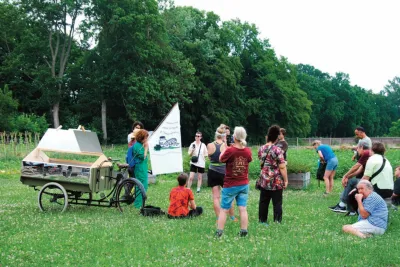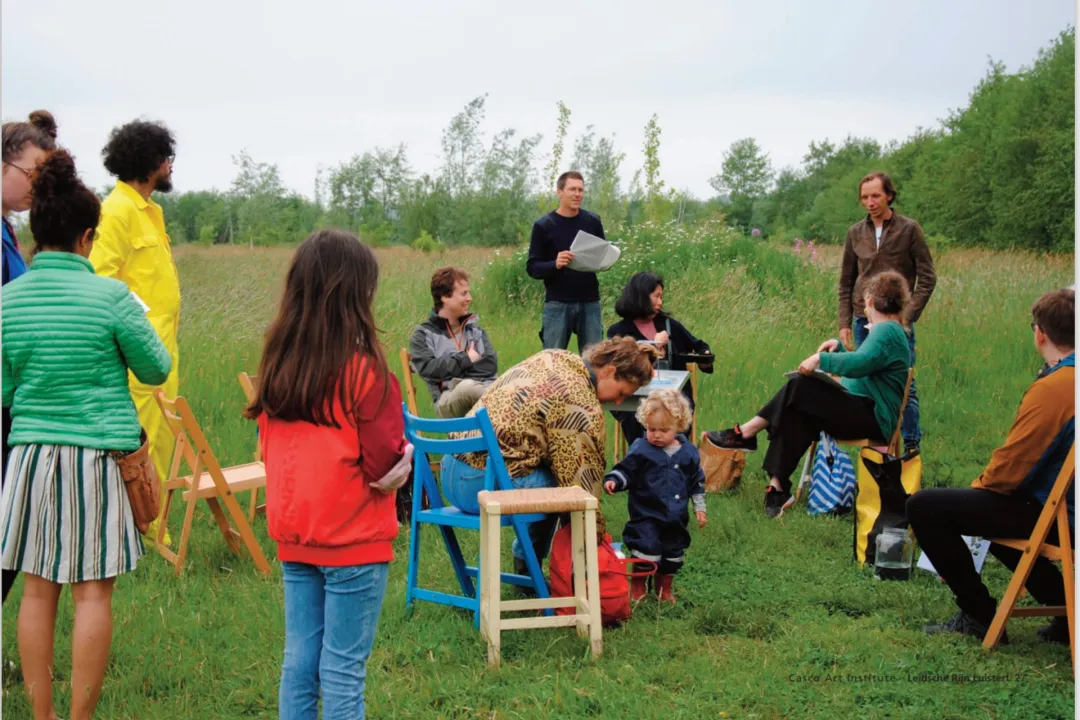General information
RDP Priority
- P6. Social inclusion and local development
RDP Focus Area
- 6B: Local development
RDP Measure
- M19: LEADER/CLLD
Summary
European rural development potential can be strengthened through urban residents visiting farming communities. This promotes knowledge transfer and creates opportunities for partnerships between urban and rural stakeholders. When urban residents understand the interdependence between their lifestyles and the health of rural communities, they are more likely to advocate for policies that support sustainable development initiatives.
Farm diversification projects that allow city residents to experience the origins of their food aid appreciation of farming and help revitalise rural economies by creating new markets for local products that encourage sustainable land use.
An innovative Dutch LEADER project was established within this framework. Arts and mobile capacity-building services provided a medium for bridging gaps between the city and the countryside during a two-year ‘Leidsche Rijn’ LEADER project, featuring artistic installations, excursions, and workshops reconnecting residents with their environment, teaching forgotten skills, and encouraging reflection on modern habits.
Results
- 1 550 rural and urban participants were networked by the project.
- Nearly 30 field trips happened, plus excursions that were combined with a workshop.
- Nearly 20 farmers and agricultural entrepreneurs were connected.
- A local ecological food market has been initiated and held every year since.
- 12 schools (with children up to 18 years) have been reached through an educational programme.

Promoter
Casco / Travelling Farm Museum
Funding
Total project cost: 177 925 (EUR)
EAFRD: 44 481 (EUR)
National/Regional: 44.481 (EUR)
Private/own: 88 963 (EUR)
Ressourcen
Context
European rural development potential can be strengthened through the active involvement of urban residents visiting and engaging with farming communities. These interactions foster a mutual understanding of the ecological, economic, and cultural benefits that rural areas provide. Urban visitors can gain insights into sustainable agricultural practices, local food systems, and biodiversity conservation strategies that are often overlooked in metropolitan settings. Such visits not only promote knowledge transfer but also create opportunities for partnerships between urban and rural stakeholders, ultimately leading to innovative solutions for shared challenges such as climate change and food security.
The Netherlands serves as an exemplary case study for this community-led approach to rural development. Much of the country is characterised by a unique polder landscape and a strong tradition of cooperative farming practices.
Dutch farmers have embraced direct marketing strategies such as farm-to-table initiatives that allow city residents to experience the origins of their food firsthand, fostering a deeper appreciation for agricultural landscapes. Such interactions help contribute to revitalising rural economies by creating new markets for local products while encouraging sustainable land use practices. When urban residents understand the interdependence between their lifestyles and the health of rural communities, they are more likely to advocate for policies that support sustainable development initiatives.
An innovative good practice Dutch LEADER project was established within this backdrop of rural development opportunities. Arts and mobile capacity-building services provided a medium and force for attracting exchanges that bridge the gaps between the city and the countryside.
Objectives
This LEADER project started as the initiative of Leidsche Rijn Luistert, and was supported by the area’s LAG for its beneficial scope to:
- remove gaps between the city and the rural countryside.
- connect citizens with farmers near their living area.
- help people find their way directly to organic farmers.
- help farmers connect with citizens, both younger and older.
- allow people to recognise the intrinsic value of their neighbourhood and living together.
Activities
Over two years, the project featured artistic installations, excursions, and workshops throughout Leidsche Rijn, reconnecting residents with their environment, teaching forgotten skills, and encouraging reflection on modern habits.
LEADER helped cover the costs of organising, implementing, and analysing:
- excursions and discussions.
- workshops and lectures.
- exhibition and education experiences (at school, in the workshop, and on location).
- a Local food market, Harvest Festival, and Food game.
Main results
- 1550 rural and urban participants were networked by the project.
- Nearly 30 field trips occurred, plus excursions that were combined with a workshop.
- 47 workshops covered these themes: recognising meadow birds; canning; art research; collective designing and building; compiling and creating a toolkit; animation; edible plants; the art of litter; interwoven life; pure water; and Avatars.
- Nearly 20 farmers and agricultural entrepreneurs were connected.
- Various podcasts were created.
- A Food game was developed in collaboration with Play de City.
- An exchange was set up with farmers in Maastricht, and a Food Art Film Festival has been held.
- A local ecological food market has been initiated and held every year since.
- 12 schools (with children up to 18 years) have been reached with an educational programme.
- An “(un)learning kit” has been created, with which teachers can work independently.
Key lessons
- Fostering connections between urban visitors and farming communities in Europe holds significant potential for improving mutual understanding and respect within rural development actions.
- The Netherlands serves as an exemplary case study due to its innovative approaches to rural-urban integration. The country's emphasis on community-led initiatives, such as local food networks and agritourism, showcases how collaboration can enhance local economies while preserving cultural heritage. Furthermore, Dutch policies support sustainable farming practices that are environmentally friendly, making them attractive to urban consumers increasingly concerned about sustainability.
- Ultimately, successful rural development projects hinge on creating inclusive platforms for dialogue and cooperation between diverse stakeholders. By learning from the Dutch experience, other regions can cultivate similar synergies that benefit both rural residents and urban populations.
- Arts and culture can be a powerful agent for rural development action within LEADER communities.
If we look at the realised connections between farmers, citizens and artists, the quality of that connection can be expressed in personal impressions, impact and, for example, repetition or imitation. In evaluations and follow-up discussions, social media and other feedback, we have found that there have been mainly new experiences that were highly valued. It was often mentioned that the wheels under this project had a widely recognised novelty; cycling to the farmer together and vice versa; the farmer welcoming a group of cyclists into the yard...
Asia Komarova

